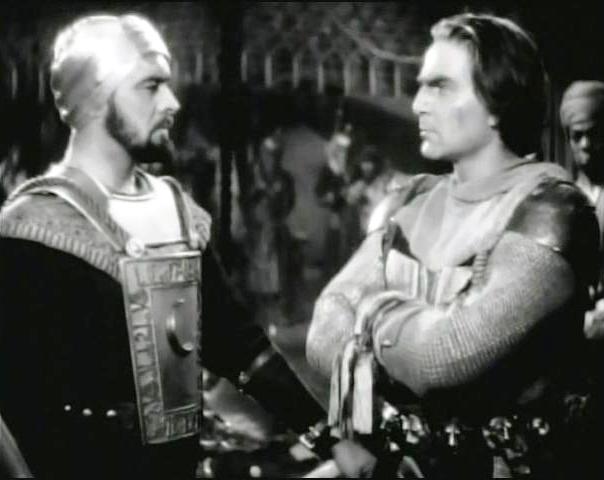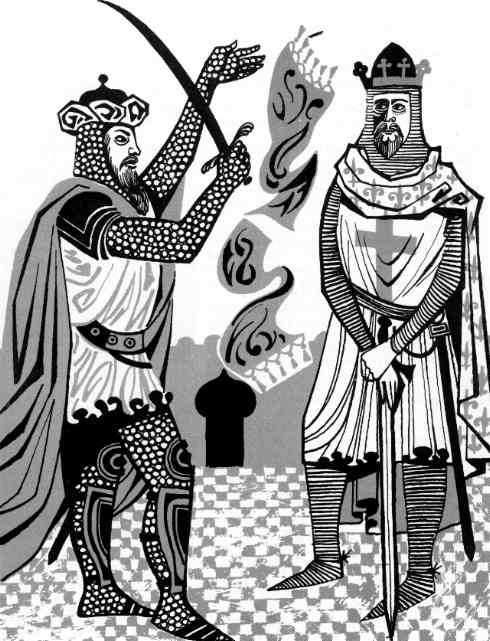Richard and Saladin’s Swords March 28, 2016
Author: Beach Combing | in : Medieval , trackbackOne of the pleasures of writing a history blog is revisiting certainties, some picked up in infancy, and exposing them for the callow lies that they are. Many moons ago when Beach was learning to read he had a ladybird book on Richard the Lionheart. In those revered pages there was an image of a meeting between two of the great men of the Middle Ages, Richard I of England and Saladin. In this chivalric encounter both sides had to impress the other and Richard, perhaps the greatest general of the Middle Ages, using his strong Christian sword, severed a piece of metal, while Saladin, perhaps the greatest ruler from the medieval Arabic world, cut a handkerchief in half with his razor sharp scimitar. Naively Beach had always believed this story: the two heroes of the two great world faiths, messing around like ten-year old comparing their toy car collections.
Now for the let down. Saladin and Richard I never met (save possibly in battle): though Richard tried to set up an encounter at Jaffa, Saladin refused pointing out that the two were at war. So where does the story come from? Well, there are two answers to this: the broader and the more exact answer. First, the hinterland. Saladin had a very unusual role in European culture from the late twelfth century onwards: he was absorbed enthusiastically into Christian tradition as a noble heathen. There were remarkable stories that Saladin had been secretly knighted. He was supposed to have disguised himself as a doctor so he could treat Richard personally when the English king was ill. There are even, incredible, instances of Saladin’s name being adopted as a personal name in Christendom: there are, for example, records from medieval Venice. The love of a noble foe then meant that Saladin had a special place in Christian hearts, that the remarkable Kurd would have found bizarre, from as early as the thirteenth century. The ‘friendly’ Arab or Turk in some of the modern retellings of Robin the Hood, are Saladin in disguise. All these may be confused memories of a shared respect between the two leaders: Richard had tried to have Saladin’s brother marry a Christian and convert, a form of respect that could have been misunderstood…
So much for the background to the tale. The story itself seems to come from a novel, Sir Walter Scott’s Talisman in 1825. Here is the relevant passage.
‘Had I not,’ said Saladin, ‘seen this brand flaming in the front of battle, like that of Azrael, I had scarce believed that human arm could wield it. Might I request to see the Melech Ric strike one blow with it in peace, and in pure trial of strength?’
‘Willingly, noble Saladin,’ answered Richard; and looking around for something whereon to exercise his strength, he saw a steel mace held by one of the attendants, the handle being of the same metal, and about an inch and a half in diameter. This he placed on a block of wood.
The anxiety of De Vaux for his master’s honour led him to whisper in English, ‘For the blessed Virgin’s sake, beware what you attempt, my liege! Your full strength is not as yet returned, give no triumph to the infidel.’
‘Peace, fool!’ said Richard, standing firm on his ground, and casting a fierce glance around; ‘thinkest thou that I can fail in his presence?’
The glittering broadsword, wielded by both his hands, rose aloft to the King’s left shoulder, circled round his head, descended with the sway of some terrific engine, and the bar of iron rolled on the ground in two pieces, as a woodsman would sever a sapling with a hedging-bill.
‘By the head of the Prophet, a most wonderful blow!’ said the Soldan, critically and accurately examining the iron bar which had been cut asunder; and the blade of the sword was so well tempered as to exhibit not the least token of having suffered by the feat it had performed. He then took the King’s hand, and looking on the size and muscular strength which it exhibited, laughed as he placed it beside his own, so lank and thin, so inferior in brawn and sinew.
‘Ay, look well,’ said De Vaux in English, ‘it will be long ere your long jackanape’s fingers do such a feat with your fine gilded reaping-hook there.’
‘Silence, De Vaux,’ said Richard; ‘by Our Lady, he understands or guesses thy meaning, be not so broad, I pray thee.’
The Soldan, indeed, presently said, ‘Something I would fain attempt, though wherefore should the weak show their inferiority in presence of the strong? Yet each land hath its own exercises, and this may be new to the Melech Ric’. So saying, he took from the floor a cushion of silk and down, and placed it upright on one end. ‘Can thy weapon, my brother, sever that cushion?’ he said to King Richard.
‘No, surely,’ replied the King; ‘no sword on earth, were it the Excalibur of King Arthur, can cut that which opposes no steady resistance to the blow.’
‘Mark, then,’ said Saladin; and tucking up the sleeve of his gown, showed his arm, thin indeed and spare, but which constant exercise had hardened into a mass consisting of nought but bone, brawn, and sinew. He unsheathed his scimitar, a curved and narrow blade, which glittered not like the swords of the Franks, but was, on the contrary, of a dull blue colour, marked with ten millions of meandering lines, which showed how anxiously the metal had been welded by the armourer. Wielding this weapon, apparently so inefficient when compared to that of Richard, the Soldan stood resting his weight upon his left foot, which was slightly advanced; he balanced himself a little, as if to steady his aim; then stepping at once forward, drew the scimitar across the cushion, applying the edge so dexterously, and with so little apparent effort, that the cushion seemed rather to fall asunder than to be divided by violence.
‘It is a juggler’s trick,’ said De Vaux, darting forward and snatching up the portion of the cushion which had been cut off, as if to assure himself of the reality of the feat; ‘there is gramarye in this.’
The Soldan seemed to comprehend him, for he undid the sort of veil which he had hitherto worn, laid it double along the edge of his sabre, extended the weapon edgeways in the air, and drawing it suddenly through the veil, although it hung on the blade entirely loose, severed that also into two parts, which floated to different sides of the tent, equally displaying the extreme temper and sharpness of the weapon, and the exquisite dexterity of him who used it.
There are lots of versions of this story: in some Saladin cuts and handkerchief or a shawl, in others Richards chops down a tree… But Beach’s interest is the age of the tale. Is Walter Scott’s really the oldest? Or is there some kind of medieval or early modern version of this tale: drbeachcombing AT yahoo DOT com
A point of interest, this scene may have been the origin of a very unchivalric meeting between Saladin and Richard I in The Crusades (1935)

28 Mar 2016: Chris S writes ‘I’ve seen this sword story before, but neither Richard nor Saladin were the actors. The tale was to convey the quality of Damascus steel to Europeans. Damascus steel, holding a finer edge than imagined by Christendom, cut a silk handkerchief as it fell upon the blade without any effort from the wielder. On the other hand it could be a cautionary parable for Europeans winning by brute force, but Muslims win by patience as others cut themselves against Islamic resolve. Possibly a testament to Saladin’s talent as a tactician.’
It would be interesting to track this story down too…
30 Apr 2016: Gary writes in: ‘About Saladin’s brother (in your Saladin and Richard swords piece): Saladin’s brother marrying a Christian is the background for Lessing’s Nathan the Wise, which takes place in Jerusalem in 1192. Saladin leaves a Templar undecapitated because he looks like his dead brother. Soon after, the Templar rescues the daughter of the absent Nathan from a fire. Complications and philosophical discussions on religious tolerance ensue, until all is revealed in the last scene: the Templar and the daughter turn out to be the children of Saladin’s brother who married a Christian and expired in Suabia.



